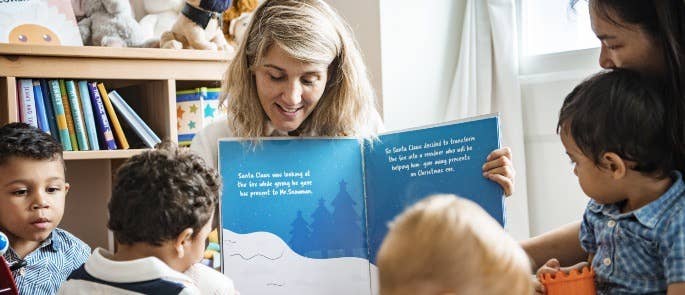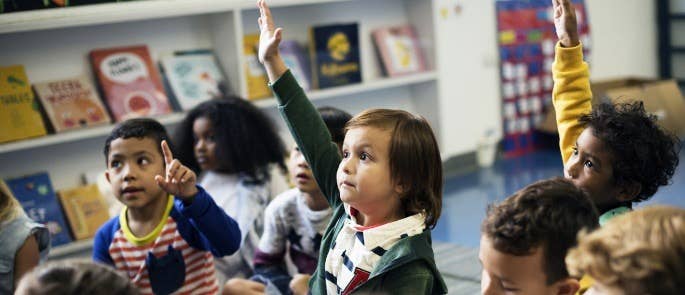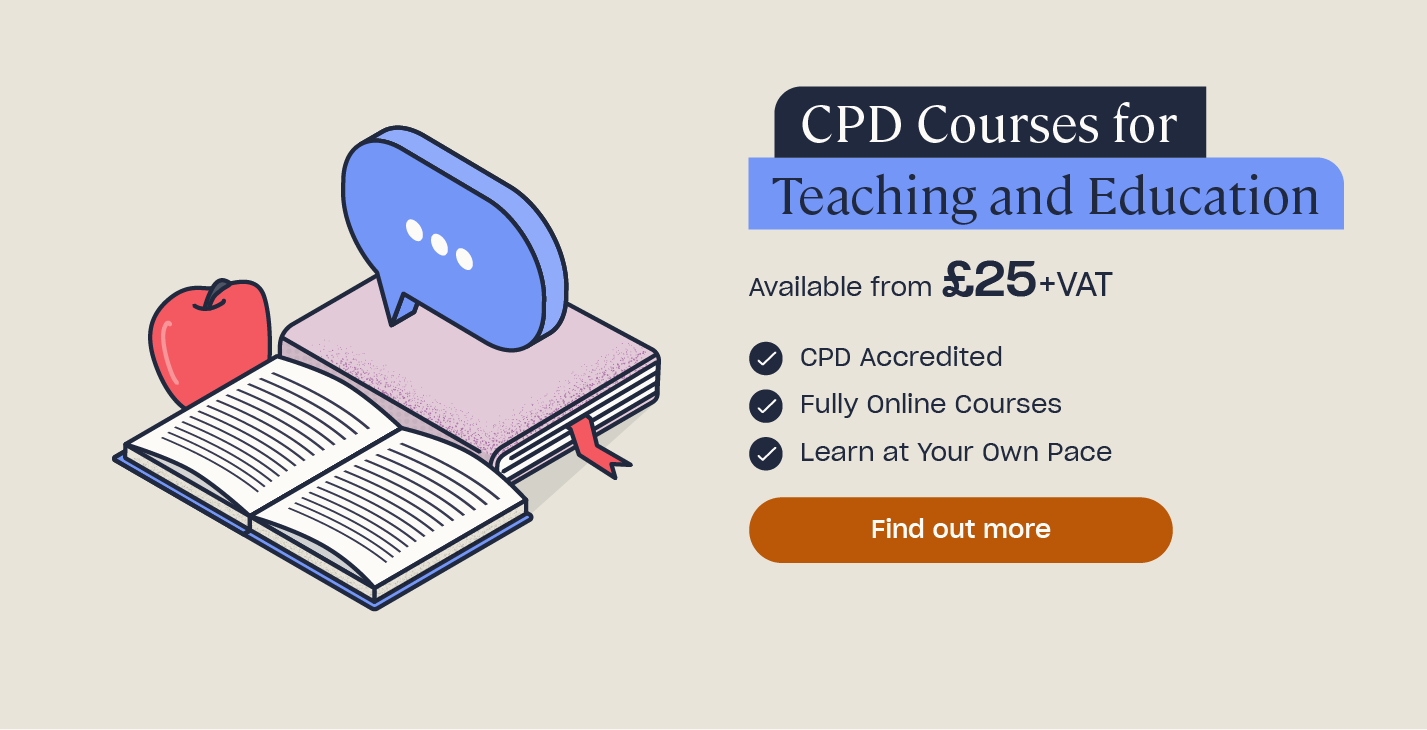Why is Reading so Important for Children?
Reading allows us to be transported from our own world to another. Between the pages of a book, we can become immersed in the lives of fictional characters and learn about a culture entirely different from our own. We can also learn new words and phrases, experience a range of emotions, and acquire skills and knowledge.
Because of the learning potential, the effects of reading on child development are vast and multiple studies have highlighted its benefits. As such, teachers and parents are in a great position to ensure reading is a key part of children’s daily routine. We’ll give you some more information as to why this is so important and provide some tips that you can use both in and out of the classroom.

What Are the Benefits of Reading for Children?
The importance of reading for children cannot be underestimated. Reading for pleasure can benefit a child’s education, social and cognitive development, their wellbeing, and their mental health.
What are the Effects of Reading on Child Development?
Numerous pieces of research conducted and commissioned by BookTrust have discovered the profound benefits of reading for a child’s development. One study details the effects of reading on later literacy skills, facilitating social interaction between adults and children, and encouraging children to engage with the world around them. It also states how reading can be a ‘stable source of information’ throughout a child’s life. This stability allows them to access text in a constant fashion and can be especially beneficial for children growing up in challenging circumstances.
Interested In Child Wellbeing?
We offer a comprehensive range of Safeguarding Courses from Challenging Behaviour Training to Designated Safeguarding Lead. All of our courses are fully online, available on all devices, and able to start immediately after purchasing.
There are multiple other benefits that reading can have on a child’s development, including:
Assisted cognitive development. Cognitive development refers to how we perceive and think about our world in reference to our intelligence, reasoning, language development, and information processing. By reading to children, you provide them with a deep understanding about their world and fill their brains with background knowledge. They then use this acquired background knowledge to make sense of what they see, hear, and read, which aids their cognitive development.
Developing empathy. When we read a book, we put ourselves in the story in front of us. This allows us to develop empathy as we experience the lives of other characters and can identify with how they are feeling. Children can then use this understanding to empathise in the real world with other people. Additionally, children will gain a greater understanding of emotions, which can help them understand their own emotions and those of others. This helps dramatically with their social development.
Gaining deeper understanding. A book can take us anywhere: to another city, to a different country, or even to an alternative world. By reading a book, a child learns about people, places, and events that they couldn’t learn otherwise. This gives children a deeper understanding of the world around them and cultures that are different from their own.
Building stronger relationships. If a parent reads with a child on a regular basis, then they will undoubtedly develop a stronger relationship with them. Reading provides parents with an opportunity to have a regular and shared event that both parent and child can look forward to. Furthermore, it provides children with feelings of attention, love, and reassurance which is key for nurturing and wellbeing.

What is the Importance of Stories in Child Education?
Reading with children can help to create a love of reading for life. Multiple studies have found a correlation between reading for pleasure and higher academic achievement in every subject, not just English.
The benefits of reading with children on their education is wide-ranging:
Improved literary skills. Reading with aloud with young children, even if they can’t fully understand what you are saying, gives them the skills they need for when they begin to read by themselves. It shows children that reading is something achieved by focusing from left to right and that turning pages is essential for continuing. Reading to children in even the earliest months of their lives can help with language acquisition and stimulating the part of the brain that processes language.
More extensive vocabulary. Hearing words spoken aloud can expose children to a range of new vocabulary and phrases that they may not have heard otherwise. By reading to a child daily, they’ll learn new words every single day.
Greater concentration. Regular and consistent reading can help to improve a child’s concentration abilities. Furthermore, it will help a child learn to sit still and listen for long periods of time, which will benefit them in their schooling.
Higher levels of creativity and imagination. Reading a book relies on us using our imagination for picturing characters, visualising their settings and environment, and guessing what’s coming next. We must use our imagination if we are to learn about other people, places, events, and times. In turn, this developed imagination leads to greater creativity as children use the ideas in their heads to inform their work.
Finally, the more that a child is read to, and the more that they read themselves, the better they will become at it. Practice really does make perfect and, the more a child reads, the better their overall academic achievement and social skills, like empathy, will be.

The Top Ten Benefits of Reading for Children
Based on what we’ve discussed above, here are the top 10 benefits of reading for children:
- Their vocabulary is larger and more extensive.
- They perform better academically.
- Their imagination can run wild.
- Their creativity skills develop.
- They develop empathy.
- They gain a deeper understanding of their world.
- Their concentration levels improve.
- The parent and child bond improves.
- Their cognitive development is supported.
- Their social skills and interaction improve.
How to Read with Your Child
Reading aloud is an enjoyable activity that both parents and children alike can enjoy. Additionally, it is an activity that teachers find fulfilling and that they should encourage regularly, both at school and at home.
How Parents Can Read with Their Child
If you read with your child at home, then you are supplementing what they learn in the classroom as well as giving them additional one-on-one support that the classroom cannot give. To have successful and effective reading sessions, consider the following:
Start young. Even during infancy, a child can look at pictures and listen to your voice. Read aloud to your child and point to the pictures on the page, saying the name of the objects that appear. This provides your child with two sources of information: an understanding of real-world objects and an understanding of the importance of language. Even when your child can read by themselves, you should still read aloud together for practice.
Make it part of your routine. Try your best to read to your child every day and keep it consistent. Incorporate this into your, and your child’s, daily routine until it becomes as much of a habit as them brushing their teeth. However, try not to be discouraged if you miss a day – just pick your routine back up as normal when you have time.
Encourage variation. Try to vary the books that you read to your child as much as possible. This will open their eyes to a range of different worlds, cultures, and characters, and allow their imagination to be stretched and thrive.
Have patience. Sometimes we can forget what it’s like to be that age and what we were like. As an adult we take reading for granted, but it’s easier to be patient with a child when we remember how much they don’t know yet. For example, how is a child going to know to read from left to right until you point at the words as you go? How are they to know that each scrawl on the page represents a word? Take your time and be patient if they don’t understand.
Continue the discussion. After you’ve finished reading a story to your child, consider trying to keep it going. Age depending, you could ask them questions about what they’ve just read. For example, “Did you enjoy that story?”, “Who was your favourite character?” or “Why do you think the prince was happy at the end?”. However, don’t feel that this is necessary for every single story you read. If your child enjoys the book, it will develop a love of reading anyway, even without the conversation.

How Teachers Can Encourage Reading
If you’re a teacher, reading to your class will probably be second nature. However, there may be certain children in your class who only get the chance to read in school and not at home. This could be for a variety of reasons, however, try and communicate to parents the importance of reading with their child. To do so, you could:
Circulate a newsletter. You could create a fortnightly/monthly newsletter that details what your class has read in that fortnight or month and why. Then, say how parents can continue with the chosen reading topic at home. For example, if you have been studying science fiction in your class that fortnight then you could include some suggestions for other science fiction books that parents can read at home.
Start a book club. If you have the time, you could start a book club with your class or across the school. As part of this, you could suggest a book per week, or month, that children have to read at home. Then, check their understanding of, and engagement with, that book by holding regular meetings.
Get the children involved. Make it known to your pupils that reading is valuable and fun. Ask your class to make posters that encourage others to read or create a display where each student can write what their favourite book is and why. Doing so will help to foster a love of reading in them that makes them want to read at home.
Lead by example. Let your students know that you read and you enjoy it. Talk to them about a book you’ve recently read or your all-time favourite book. You could also read a book yourself when your students are having silent reading time. This will help to motivate your students to read themselves. Finally, communicate this to parents and ask them to do something similar at home.

Reading is a powerful, fulfilling, and rewarding activity. Not only does a book act as a comfort and a friend, it also acts as a teacher and can teach children all about themselves, their world, and the cultures within it. Reading with children has numerous benefits and is something all parents and teachers should encourage.
What to Read Next:
- How to Promote a Reading Culture in Schools
- What is Effective Questioning and Why Should I Use it in my Classroom?
- Promoting Social Development in Children Through Structured Group Play
- Education Training Courses
- Creative Writing Quiz
- Reading and Mental Health: What are the Benefits?
- The Importance of Phonemic Awareness: Teaching Strategies
- The Importance of Routine for Children: Free Weekly Planner
- Why is Child Development So Important in Early Years?
- Supporting Language Development in the Early Years
- What is Visual Literacy?











